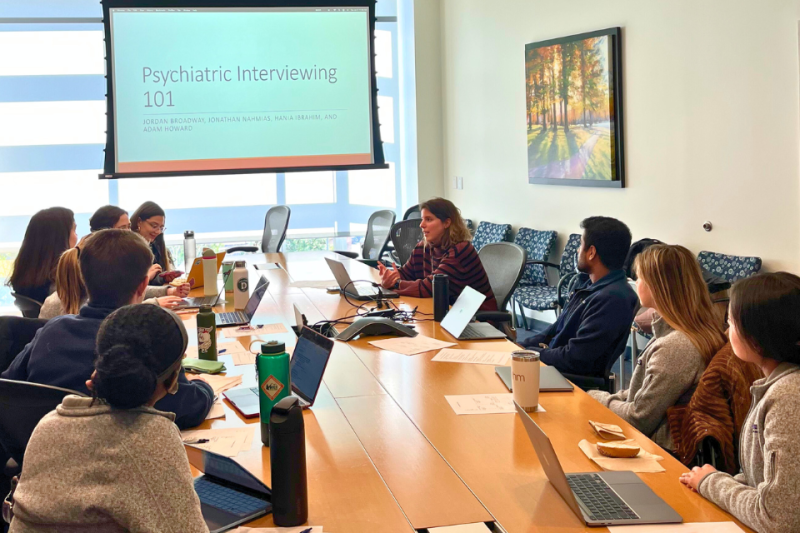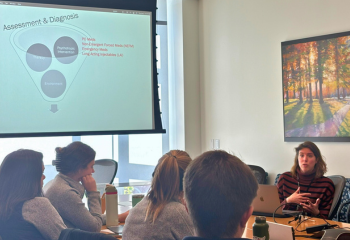
“Grey’s Anatomy,” one of the most popular medical dramas of all time, often depicts residents as selfish, competitive, and unkind to students under their ranks. Jordan Broadway, MD, a fourth-year psychiatry resident, laughingly emphasized that Duke residents are the complete opposite.
“I think every resident remembers being a med student. There’s a lot of fun workroom banter and a lot of good camaraderie,” Broadway said. “Med student and resident relationships tend to be really positive. We love med students.”
A new workshop recently designed and implemented by three senior residents in Duke Psychiatry & Behavioral Sciences reflects this dynamic. This summer, on a volunteer basis, Jonathan Nahmias, MD, Hania Ibrahim, MD, and Broadway began teaching second-year medical students in their psychiatry clerkship how to conduct a psychiatric interview.
The idea was initiated by Cerrone Cohen, MD, director of the Duke Psychiatry & Behavioral Sciences’ clerkship for medical students. Cohen explained the origin of the workshop: “I was looking at the end of the year and thought, ‘What are the parts where we can get better as a clerkship?’ And one thing that was missing was the psychiatric interview,” he said. “Then I reached out to some of the residents, and the actual planning of the workshop has been entirely them. They designed the content. It’s been a really successful work.”
The psychiatric interview is one of the most critical skills a psychiatrist must develop. Over the course of 45 to 90 minutes, psychiatrists ask patients a series of purposeful questions to determine a diagnosis and subsequent treatment plan. Cohen adds that, in addition to gaining an accurate assessment, the psychiatric interview is all about “establishing an adequate level of rapport with a patient and putting the patient at ease.”
But asking the questions is not an easy task. Nahmias, a fourth-year psychiatry resident, says that the psychiatric interview “can be intimidating because we’re asking about what can be people’s deepest secrets.” He describes the delicate balance of asking the patient necessary questions while being trauma-sensitive about asking them in a way that doesn’t harm the person.
Broadway adds that “trauma history, substance abuse, and suicidal thoughts are some of the hardest things to talk about.”

Because of the level of sensitivity, conducting a psychiatric interview is a skill developed over years of experience. Learning how to effectively teach a skill that takes years hasn’t been completely challenge-free for residents. “I would say that the hardest part was trying to come up with a way to effectively cover something in 90 minutes when we spend years learning how to do it, and to do it in a way that makes it feel approachable and accessible for the med students,” Nahmias admitted. “That was actually really hard.”
Despite the difficulties, residents have worked for months to create a robust, interactive workshop that includes lectures on a standardized version of the interview and mock psychiatric interviews with residents acting as patients. The workshop has been delivered four times so far, and residents have been strongly encouraged by the outcomes.
“It’s really fun to see the beginning of the workshop when people are a little bit anxious and not super engaged with the content. And then fast forward to the end of the workshop, people are much more relaxed. They're much more confident in asking questions,” Broadway explained.
“It’s very rewarding, getting to work with medical students. We do it purely because we really enjoy the work and the medical students are a very eager population to learn,” Nahmias added.
“The more exposure, practice, and guidance you have, the more you’re in a position to be able to figure it out—and that’s why it was helpful to have the workshop.”
— Andrea Augustine
Andrea Augustine, a second-year medical student, reflects on her experience with the workshop. “I definitely felt nervous going in. And when you’re just learning, you have lots of awkward moments,” Augustine said. “But patients, attendings, and residents are very cognizant of the fact that you’re starting out and are very patient with it. The more exposure, practice, and guidance you have, the more you’re in a position to be able to figure it out—and that’s why it was helpful to have the workshop.”
Cohen stresses how proud he is of the residents and just how essential their work is to the department’s undergraduate medical education program. “I’m excited that they get a chance to get recognized for the work they're doing because they’re an integral part of what makes our program successful,” he said.
The workshop will continue to be offered to future cohorts of medical students during their psychiatry clerkship.